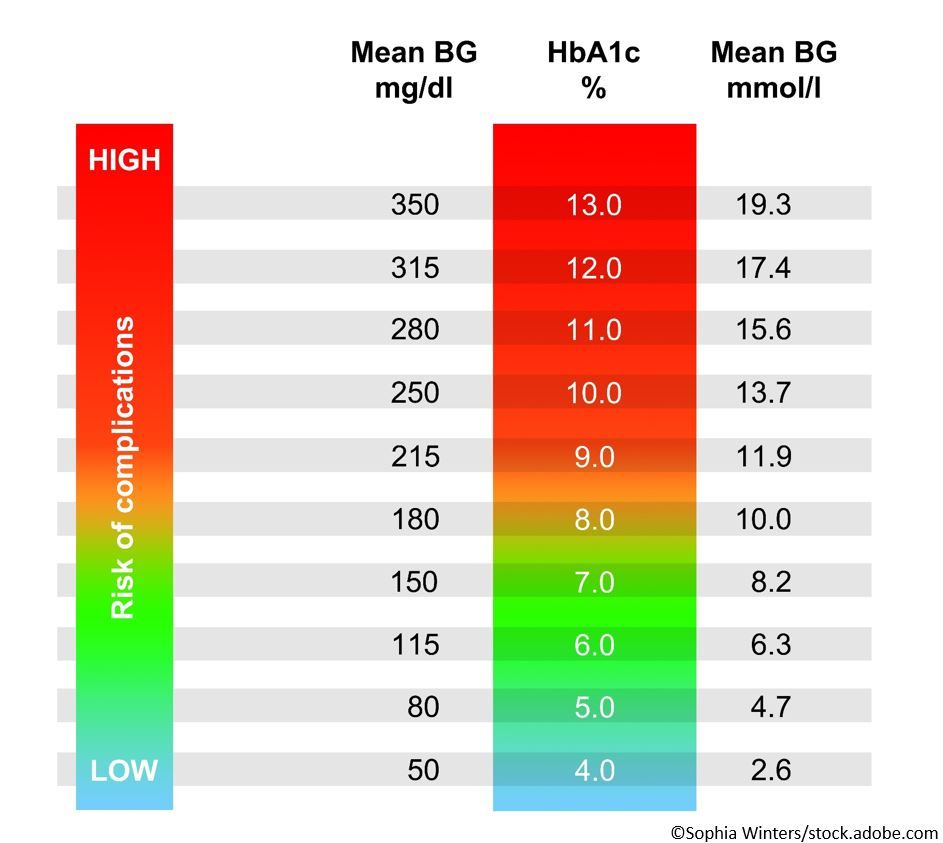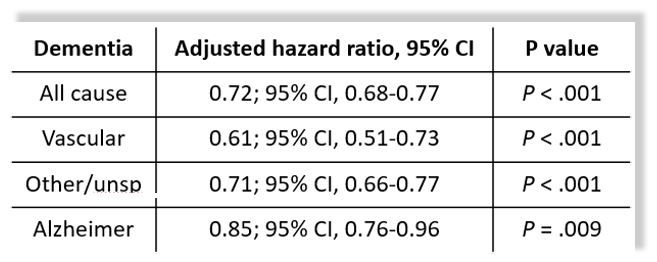- Clinical Technology
- Adult Immunization
- Hepatology
- Pediatric Immunization
- Screening
- Psychiatry
- Allergy
- Women's Health
- Cardiology
- Pediatrics
- Dermatology
- Endocrinology
- Pain Management
- Gastroenterology
- Infectious Disease
- Obesity Medicine
- Rheumatology
- Nephrology
- Neurology
- Pulmonology
Tighter Glycemic Control in Type 2 Diabetes May Reduce Risk for All-Cause Dementia: New Findings
Comprehensive management of T2D in primary care settings reduced risk of all-cause dementia by 28%, with lower HbA1c linked to lower, but still elevated risk.
In a large cohort of individuals with type 2 diabetes, multidisciplinary care in a primary care setting was linked to a 28% lower risk of all-cause dementia, including a 39% lower risk of vascular dementia and a 29% lower risk of other subtypes of dementia, according to findings from a study in Hong Kong where 90% of persons with T2D are managed within the public health care system.
Study investigators also found that a "moderate glycemic control target" of between 6.5% and 7.5% was associated with lower incident dementia, although they found risk was increased even at lower glycemic targets. The results were published online February 12, 2024 in JAMA Network Open.
©Sophia Winters/stock.adobe.com

For the retrospective matched cohort study of more than 55 000 participants (mean age, 62.3 years) investigators randomly assigned half the group to a multidisciplinary, primary care management program called Risk Assessment and Management Program-Diabetes Mellitus (RAMP-DM) and the other half to usual care. During a median follow-up period of 8.4 years, 6.97% of participants receiving RAMP-DM care received a diagnosis of dementia and 9.81% of those receiving usual care received the diagnosis. The incidence rate of dementia per 1000 person years also was lower for the RAMP-DM care group (9.31) than for the usual care group (14.02)
T2D is associated with an approximately 50% greater likelihood of all cause dementia and the risk trends higher in Asian populations, according to research cited by first author Kailu Wang, PhD, of the Chinese University of Hong Kong, and colleagues. In fact, having T2D has also been linked to several of the pathological features of Alzheimer disease (AD), including vascular damage, overaccumulation of amyloid-β and tau phosphorylation, and chronic neuroinflammation. Despite the known associations, however, there is little research assessing the effectiveness of glycemic control measures on dementia outcomes. Studies that have investigated intensive glucose lowering and incident dementia have been limited by use of surrogate endpoint markers and short follow-up periods.
Wang and the research team point to the success of the multidisciplinary RAMP-DM program, established in Hong Kong in 2009 to enhance all aspects of T2D management and outcomes. RAMP-DM has reduced hyperglycemia and as well as risk of mortality by 55%, of macrovascular events by 48%, and of microvascular events by 32%, with a follow-up period greater than 9 years, they wrote. RAMP-DM provided an ideal foundation to analyze the association between the effects of comprehensive T2D management services and risk of all-cause dementia and subtypes of dementia and also to evaluate the association of glycemic control with incident dementia.
To create the retrospective study's data set, Wang et al tapped electronic health care records for all individuals who used public health care services in Hong Kong from 2011 to 2019. Investigators identified all adults diagnosed with T2D in 2011, excluding those with type 1 diabetes, gestational diabetes, or pre-existing dementia. Researchers matched participants receiving RAMP-DM plus usual care in a 1:1 ratio with patients who received usual care only. Follow-up continued until occurrence of outcome events, death, or the study end in December 2019.
The primary outcome was dementia incidence and secondary outcomes included AD, VD, and other types of dementia. The primary analysis focused on RAMP-DM use and explored early-stage HbA1C levels after joining RAMP-DM in relation to dementia incidence.
The final cohort, after propensity score matching, numbered 55 618 participants; mean age was 62.28 years and 51.4% were women, and participants were divided equally between the RAMP-DM group and usual care, with 27 809 in each. The overall mean time since T2D diagnosis was 5.9 years and the mean HbA1c level at baseline was 7.31%.

In addition to the reduced risk of all cause and subtypes of dementia associated with use of RAMP-DM (table at right), when Wang et al analyzed the association between mean HbA1c levels during early follow-up (years 1-3) and risk of dementia, they found that compared to the reference group (between 6.5%-7.5%), risk was higher for participants with HbA 1C levels between 7.5% and 8.5% (aHR, 1.33; 95% CI, 1.19-1.48) and higher than 8.5% (aHR, 1.54; 95% CI, 1.31-1.80). Importantly they also found that the risk of dementia remained higher for participants with HbA 1C levels lower than the reference group, ie, for HbA1c 6%-6.5% (aHR 1.17; 95% CI, 1.07-1.29 and HbA1C <6% (aHR , 1.39; 95% CI, 1.24-1.57).
“This cohort study of patients with T2D provided evidence that a multidisciplinary and individualized diabetes management program in primary care settings was beneficial to patients with T2D in lowering the likelihood of all-cause dementia and its major subtypes,” wrote Wang et al. “Further studies could make use of prospective cohorts or RCTs to verify the effectiveness of similar diabetic management interventions on dementia risks and investigate the biological mechanism of such effects. The cost-effectiveness of such a program for reducing the risk of dementia incidence also requires further evaluation,” they concluded.
